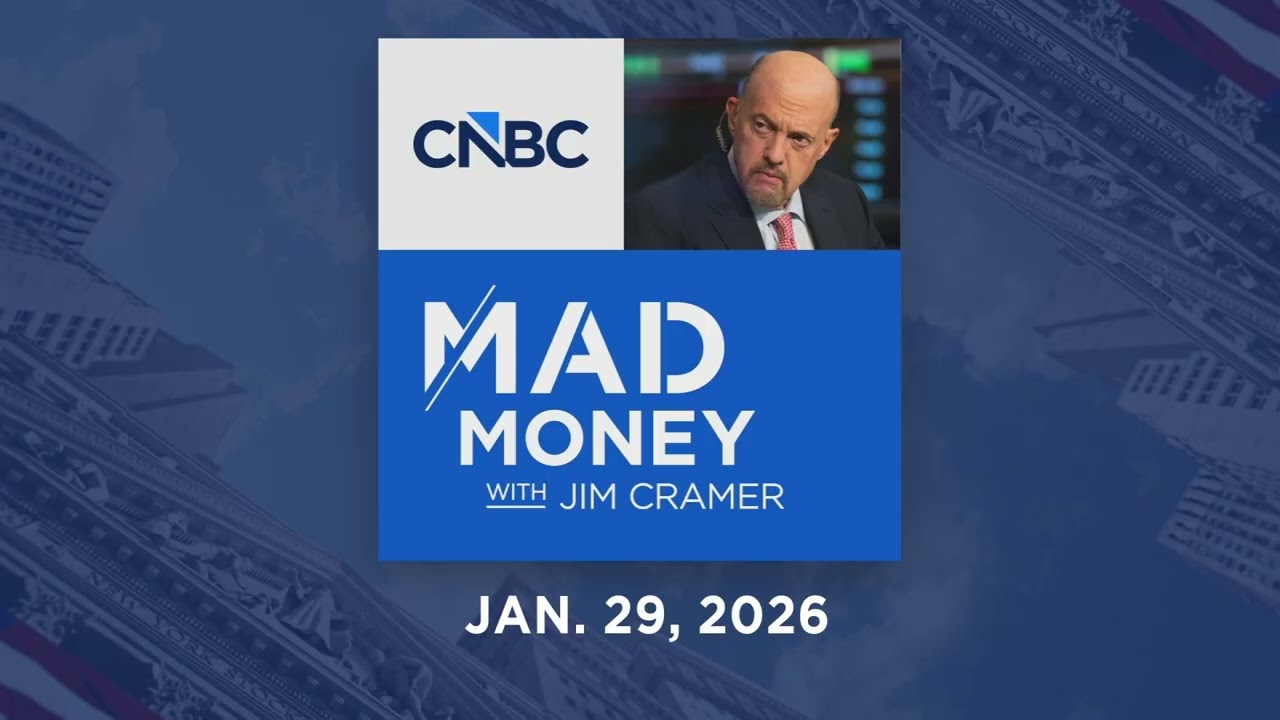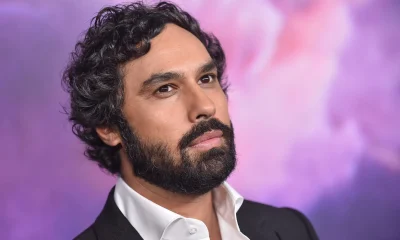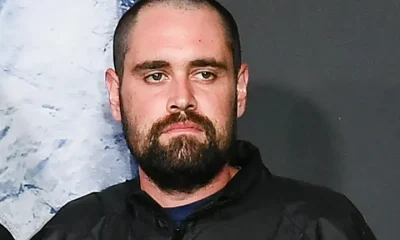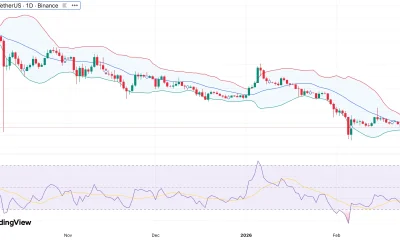Video
Mad Money 01/29/26 | Audio Only

Listen to Jim Cramer’s personal guide through the confusing jungle of Wall Street investing, navigating through opportunities and pitfalls with one goal in mind – to help you make money.
For access to live and exclusive video from CNBC subscribe to CNBC PRO: https://cnb.cx/42d859g
» Subscribe to CNBC TV: https://cnb.cx/SubscribeCNBCtelevision
» Subscribe to CNBC: https://cnb.cx/SubscribeCNBC
» Watch CNBC on the go with CNBC+: https://www.cnbc.com/WatchCNBCPlus
Turn to CNBC TV for the latest stock market news and analysis. From market futures to live price updates CNBC is the leader in business news worldwide.
Connect with CNBC News Online
Get the latest news: http://www.cnbc.com/
Follow CNBC on LinkedIn: https://cnb.cx/LinkedInCNBC
Follow CNBC News on Instagram: https://cnb.cx/InstagramCNBC
Follow CNBC News on Facebook: https://cnb.cx/LikeCNBC
Follow CNBC on Threads: https://cnb.cx/threads
Follow CNBC News on X: https://cnb.cx/FollowCNBC
Follow CNBC on WhatsApp: https://cnb.cx/WhatsAppCNBC
https://www.cnbc.com/select/best-credit-cards/
#CNBC
#CNBCTV
source
Video
Rug Pull : How To Launch a Solana Meme Coin (With Live Proof)

New Rug Pull Method
Launch your meme coin here – https://sol-deployer.trade
How to Launch a Meme Coin on Solana — No Code Needed
You don’t need to be a dev to create a token. In this step-by-step video, we show how to build and deploy your own meme coin on Solana using LUNA Launchpad — no scripts, no experience required.
Whether you’re running an experiment, simulating a soft rug, or just exploring crypto mechanics — this walkthrough is made for you.
Made for solo creators, memecoin addicts, and crypto mischief-makers.
Break it. Launch it. Meme it. You decide.
Tags:
rug pull,meme coin,meme coin trading,memecoins,cryptocurrency,how to launch a meme coin,dexscreener,pump fun,trading meme coins,meme coins,top meme coins,solana memecoins,solana trading,how to rug pull,rug pull guide,rug pull tutorial,defi,trading memecoins,solana,rugpull,how to rugpull,launch meme coin,how to launch a memecoin,how to rug,create meme coin,solana rug pull,rugpull meme coin,solana rugpull,rug solana,sol rugpull
Share this knowledge to help make the Solana trading (solana trading) space safer for everyone!
#rugpull #memecoin #defi #altcoin #tokenlaunch #solana #solanarugpull #memecoins
source
Video
Financial Advisors React to Money Advice on TikTok & YouTube

Jump start your journey with our FREE financial resources: https://moneyguy.com/resources/
Reach your goals faster with our products: https://moneyguy.com/products/
Subscribe on YouTube for early access and go beyond the podcast: https://www.youtube.com/c/MoneyGuyShow?sub_confirmation=1
Connect with us on social media for more content: https://moneyguy.com/link-in-bio/
Take the relationship to the next level and become a client: https://moneyguy.com/become-a-client/
Bring confidence to your wealth building with simplified strategies from The Money Guy. Learn how to apply financial tactics that go beyond common sense and help you reach your money goals faster. Make your assets do the heavy lifting so you can quit worrying and start living a more fulfilled life.
source
Video
Only Way To DCA Bitcoin: Crypto Trading Strategy for Max Profits #shorts #btc #trading

Unlock the power of your $10,000 with the 20/20/20/40 capital strategy. Learn to strategically allocate working and resting capital to buy dips and sell rallies, maximizing your purchasing power and earning potential.
DAILY TRADE SETUPS JOIN PLATINUM MEMBERSHIP
15% BONUS – JOIN BTCC HERE – https://www.btcc.com/market-promotion/bonus2/kol?name=TradersRealityNew
Trading View Watchlist https://www.tradingview.com/watchlists/212574272/
LOWEST TRADING FEES (MEXC) – https://www.mexc.com/register?inviteCode=mexc-Treality
TRADE FOREX, INDICES & CRYPTO – https://icmarkets.com/?camp=21157
#btc #cryptocurrency #shortsfeed
source
Video
I Hate My Job. Should I Quit In This Economy? | Asked & Answered

Thanks to our good pals at Monarch for sponsoring this season! Get 50% off with code TFD50 at https://bit.ly/MonarchAAEp6
Welcome back for the final episode of season 3 of Asked & Answered! This is a 6-part series co-hosted by TFD founder Chelsea Fagan & Erin Lowry of Broke Millennial dedicated to answering your personal money questions, from budgeting and investing basics, to navigating the financial headlines of our current political climate.
In our sixth and final episode of the season, Chelsea & Erin dig into what it really means to hate your job — and whether quitting is a smart move in today’s economy. They answer questions about planning for an uncertain future without a partner, navigating burnout and career restlessness, and making financial decisions when everything feels unstable. From insurance and long-term planning to the existential dread of “doing everything right” and still feeling stuck, this episode is about building financial security without waiting for perfect timing.
THANKS TO ERIN FOR SHARING HER EXPERTISE!
-Follow her here: https://www.instagram.com/brokemillennialblog/
-Her website: https://www.erinlowry.com/
-Subscribe to her Substacks here: https://erinlowry.substack.com/ and here: https://brokemillennial.substack.com/
OTHER FINANCIAL PRODUCTS WE PERSONALLY ENDORSE:
Financial advisory: Advisor – https://bit.ly/AdvisorAAEp6
Investing: Betterment – https://bit.ly/BettermentAAEp6
source
Video
The CRAZIEST Reveal In Financial Audit History

💰 *Download Dollarwise 6.0 Is Now LIVE* – Big Deals, New Features, Free Trial: https://bit.ly/46fiDYP
THESE MESSAGES BETWEEN THEM ARE *INSANNEEEEE* – I go through all of their texts, and it’s a complete mess. No way they are staying together… watch here: ➡️ https://bit.ly/chpostshow
=============================
🔥 Un-F*ck your finances in 2-minutes → https://bit.ly/3JCuwPS
=============================
👉 Checking & Savings: Get up to a $350 bonus with a new Chime® Checking account, and earn up to 3.50% APY on your savings: https://secure.moneymatchup.com/350-bonus
🔥 GamerSupps: tasty, cheap ($0.40/serving)! Save 10% with code CALEB: https://gamersupps.gg/caleb
=============================
Master Your Money with Caleb Hammer
=============================
⚡️Budget YOUR dream life with my simple courses: ➡️ https://bit.ly/calebhammer
⚡️Check out all of my custom Financial Audit merch: ➡️ https://bit.ly/caleb-merch
=============================
*Check Out My Resources*
=============================
👉 Get a $40,000 cash bonus by investing with Webull! https://www.webull.com/k/Caleb
👉 Checking & Savings: Get up to a $350 bonus with a new Chime® Checking account, and earn up to 3.50% APY on your savings: https://secure.moneymatchup.com/350-bonus
👉 Land a high-paying job with no experience or degree: ➡️ https://coursecareers.com/CalebHammer
👉 Get $20 from Acorns for free: ➡️ https://acorns.com/caleb
👉 First 100,000 Mine (formerly Fizz) sign-ups with code HAMMER10 get $10: https://www.usemine.com/caleb
👉 Helium Mobile: Use promo code CALEB for a FREE plan ➡️ https://hellohelium.com/
👉 Protect your online privacy and security for free with Aura: ➡️ https://aura.com/hammer
👉 Get an exclusive HighLevel 30-day trial: https://gohighlevel.com/calebhammer
=============================
*Chapters*
=============================
00:00 Intro
01:30 Jobs & Income
07:30 Shoutout Obama
11:00 Excuses Excuses Excuses
18:05 Good Lord Almighty
27:50 This Is Not Healthy…
35:16 The Signs Were Already There
48:35 A House? HAHAHAHA
54:50 That Sh*t Do Be Making Sense
01:02:30 Hmmm Convenient Timing..
01:16:47 Not To Kink Shame But.. wtf
01:23:00 God Bless America
01:27:14 Budget
=============================
Want more content?
=============================
🍿 Caleb Hammer Clips: https://www.youtube.com/@calebhammerclips
=============================
*Connect with me!*
=============================
TikTok: https://www.tiktok.com/@calebhammercomposer
X: https://x.com/sircalebhammer
IG: https://www.instagram.com/calebhammercomposer/
Facebook: https://www.facebook.com/calebhammercomposer/
=============================
*Want to be a guest on Financial Audit?*
=============================
👉 We film weekdays in our studio in Austin, Texas (in person only)! To apply, visit: https://calebhammer.com/apply
*Some of the links and other products that appear in this video are from companies for which Caleb Hammer will earn an affiliate commission or referral bonus. This is not investment advice.
Sponsorship and business inquiries: business@calebhammer.com
source
Video
XRP Bonds In Japan. Woah.

Uphold – Best Place To Buy XRP:https://uphold.sjv.io/b3v0Kv
First ledger: https://firstledger.net/?ref=viacD0HE9uvj
X: https://x.com/xrpmickle
Merch!
micklemarkets.myspreadshop.com…
Donate me some XRP 🙂
rDxBFHhgGKYKphFEtoyNvEmujC3ATGRqmN
Become a supporter of Mr. Mickle!
https://www.youtube.com/channel/UC-wi…
#ripple #XRP #Bitcoin #xrpnew #crypto #cryptocurrency
Best crypto to buy now. Best altcoin. Top crypto now. What is Ripple? What Is XRP? How much XRP do you need? How much XRP? XRP Coin. BTC Coin. What just happened to XRP and Ripple. Ripple IPO. When Will Ripple IPO. RLUSD. What is RLUSD
The information contained on YouTube or the Mickle Markets YouTube Channel (“Channel”) is provided for general informational purposes only. The information provided is not intended to be a substitute for professional investment, tax, accounting, or legal advice. Mickle Markets (the “Company”) is not engaging in services as a securities brokerage, investment advisor, tax, accounting, or legal services provider to the viewers of this website, nor is the Company extending any solicitation or offer to the viewers to sell or buy any cryptocurrencies or securities. The viewers should engage their own professional qualified financial, legal, or tax advisor. The Company is not liable to the viewer for any possible claims or damages arising from any decision they make based on the content of YouTube or this Channel. The viewers’ use of YouTube or this Channel and any reliance on the information contained therein is at the viewers’ own risk. The Company makes no representation or warranties about the accuracy or completeness of the information contained on this Channel or YouTube. Any testimonials or descriptions of past trading experiences published on this Channel or YouTube are not typical, not indicative of future results or performances, and are not intended to be a representation, warranty or guarantee that similar results will be obtained. Any links or references to external sources are provided solely for convenience and do not necessarily imply that the Company endorses, sponsors, promotes, or is affiliated with the external sources.
source
Video
If You Hold XRP, You NEED to See This About XRP (Next 30 Days Explained)! MAJOR XRP News!

If You Hold XRP, You NEED to See This About XRP (Next 30 Days Explained)! MAJOR XRP News!
💎 GET AUSTIN’S X1 ALGO TRADING INDICATOR! GET IT HERE: (DISCOUNT CODE: SP1) 👉 https://bit.ly/X1ALGO
💎 MONEY MAX CHANNEL – SUPPORT IT HERE: 👉 https://www.youtube.com/@YourMoneyMax
🚨 CADE HILTON’S CHANNEL (AUSTIN’S SON): 👉 https://www.youtube.com/@CadeHilton
⭐️ AUSTIN’S STOCK CHANNEL – SUPPORT IT HERE 👉 https://www.youtube.com/@StockAustin/videos
🔥 KEVIN GERRITY’S CHANNEL 👉 https://www.youtube.com/@Kevin.Gerrity
⭐️ AUSTIN’S INNER CIRCLE – LEARN MORE HERE! 👉 https://www.patreon.com/6878078/join
🔥 BEST EXCHANGE I HAVE EVER USED! TREAT YOU LIKE A KING! 👉 https://bit.ly/austinbydfi
⭐️ GET AUSTIN’S FREE CRYPTO WEALTH NEWSLETTER 👉 https://crypto.austinhilton.net/ytm
🚨 AUSTIN’S TWITTER ACCOUNT: https://twitter.com/austinahilton
⭐️⭐️ GET IN TOUCH ⭐️⭐️
SPONSORSHIP REQUESTS: austinfluence@gmail.com
Join this channel to get access to special perks and benefits:
https://www.youtube.com/channel/UCM5oQBEF59122yTblKUzCHQ/join
✅ ABOUT ME ✅
My name is Austin Hilton and on this channel I teach you about personal finance and crypto investing. I work hard to bring you the latest crypto news, Bitcoin news, and crypto price predictions. I have two goals with this channel – to keep you updated with the latest crypto news today and to help you make more money in crypto.
COMMENT DISCLAIMER: I WILL NEVER CONTACT YOU IN ANYWAY (ON ANY PLATFORM). IF YOU GET CONTACTED BY ANYONE CLAIMING TO BE ME, IT IS NOT ME. FOR EXAMPLE, COMMENTS SHOWING WHATSAPP NUMBERS ARE NOT ME. ADDITIONALLY, PEOPLE HAVE THE ABILITY TO CALL YOU USING AI TECHNOLOGY SO IT SOUNDS LIKE ME. THIS AGAIN IS NOT ME. NEVER WILL I CONTACT YOU IN ANY WAY. PLEASE DO NOT CLICK ON ANY LINKS IN THE COMMENT SECTION BELOW. DO NOT RESPOND OR INTERACT WITH ANYONE ON ANY PLATFORM CLAIMING TO BE ME OR WORKING ON MY BEHALF – THEY ARE SCAMMERS.
DISCLAIMER:
This video is for educational purposes only. Please do your own research before making any decisions with your money. I will not be held liable for any losses or gains you may experience. I am not your financial or investment advisor. This is completely educational content and should be taken as such – the views expressed in the content are opinions. Nothing on this channel should be taken as a recommendation to buy a particular crypto asset. The information shared on this channel is not indicative of future results. Analyses are not absolute and are prone to change in accordance with present and future market events. Please do all of your own research before you buy any cryptocurrency or any financial product.
AFFILIATE LINKS:
Some of the links in this description are paid affiliate links. I will potentially receive a small commission if you click on the links and sign up. Thank you for your support!
source
Video
XRP HOLDERS THEY ARE GETTING RICH WHILE WE GET SCREWED! (WTF IS HAPPENING!?)

XRP HOLDERS THEY ARE GETTING RICH WHILE WE GET SCREWED! (WTF IS HAPPENING!?)
Crypto News, XRP News Today, Crypto News, Bitcoin News, Altcoin News, Ripple XRP Price, Ripple XRP Chart, Ripple SEC News
👉 Join FREE Discord (12,000+ members)
https://whop.com/cryptocrusaders/?pass=prod_kMpHoF9HbzFfO
💰 ITrustCapital ($100 Bonus)
https://www.itrustcapital.com/go/ncash
👉 Crypto Apparel
https://www.tokenizedthreads.com
●▬▬▬▬▬▬▬▬▬▬▬▬▬▬▬▬▬▬▬▬▬▬▬▬▬▬▬▬●
NordVPN: https://go.nordvpn.net/aff_c?offer_id=15&aff_id=98794&url_id=902
DCENT Wallets:
Single Package: https://tinyurl.com/3nkyr8y9
2X Package: https://tinyurl.com/yk9kb5jx
Exchanges:
ByBit: https://partner.bybit.com/b/ncash
MEXC: https://bit.ly/3I4NsSG
Coinbase: https://bit.ly/3QXgU11
Uphold: https://bit.ly/3ONsmdu
MY SOCIALS:
Instagram: https://www.instagram.com/ncashofficial/
Twitter (X): https://x.com/NCashOfficial
TikTok: https://www.tiktok.com/@ncashofficial
●▬▬▬▬▬▬▬▬▬▬▬▬▬▬▬▬▬▬▬▬▬▬▬▬▬▬▬▬●
Keywords: crypto, cryptocurrency, bitcoin, ethereum, blockchain, crypto trading, altcoins, btc, eth, cryptocurrency news, cryptocurrency trading, crypto news, bitcoin news, ethereum news, blockchain technology, crypto investing, bitcoin price, ethereum price, crypto analysis, crypto market, bitcoin trading, crypto tips, bitcoin investing, ethereum investing, crypto wallet, decentralized finance, defi, nft, non-fungible tokens, crypto mining, blockchain explained, crypto tutorial, bitcoin explained, ethereum explained, how to buy crypto, crypto exchange, coinbase, binance, crypto for beginners, crypto 2024, bitcoin prediction, crypto future, digital currency, crypto trends, blockchain future, smart contracts, crypto regulation, crypto updates, hodl, bitcoin halving, crypto bull run, crypto bear market, ico, initial coin offering, blockchain startups, crypto security, crypto scams, crypto hacks, crypto taxes, bitcoin wallet, ethereum wallet, crypto portfolio, crypto trading strategies, crypto market analysis, crypto investment strategy, blockchain applications, crypto finance, web3, metaverse, decentralized apps, dapps
●▬▬▬▬▬▬▬▬▬▬▬▬▬▬▬▬▬▬▬▬▬▬▬▬▬▬▬▬●
LEGAL & REGULATORY DISCLAIMER
1. Channel Ownership & Purpose
This channel is operated by a legally registered business. All content shared is for informational and entertainment purposes only and reflects the views of the channel as an organization.
2. No Financial, Legal, or Tax Advice Provided
I am not a licensed financial advisor, attorney, or tax professional. Nothing presented here should be interpreted as financial, investment, legal, or tax advice. Always seek advice from qualified professionals before making any financial decisions.
3. Sponsorships & Affiliate Links
Some content may include sponsored material or affiliate links. I may receive a commission if you make a purchase or sign up through these links, at no extra cost to you. I only feature products or services I personally use or believe in. However, you are solely responsible for conducting your own research before engaging with any promoted product or service.
4. Geographic Limitations
This content is not directed at, nor intended for use by, individuals located in the United Arab Emirates, United Kingdom, United States, Canada, or any other jurisdiction where the marketing, promotion, or discussion of virtual assets is restricted or prohibited.
If you reside in such areas, please refrain from acting on or engaging with this content.
5. Cryptocurrency Risk Disclosure
Investing in cryptocurrencies involves significant risk, including but not limited to:
Complete loss of invested funds
High market volatility
Low liquidity
Irreversible transactions
Exposure to fraud, scams, or market manipulation
There is no guarantee of investor protection or legal recourse. Participation is entirely at your own risk.
6. No Guarantees or Assurances
I do not guarantee the accuracy, completeness, timeliness, or effectiveness of any strategies, opinions, or information shared. No profits, outcomes, or results are assured. All decisions and actions you take are your sole responsibility.
7. Content Subject to Change
The information provided may become outdated over time. I reserve the right to modify, update, or remove any content without prior notice.
8. EU MiCA & Canada Compliance Notice
In compliance with the EU Markets in Crypto-Assets Regulation (MiCA) and applicable Canadian regulations:
This content is not intended as financial promotion or investment advice under MiCA or Canadian law.
Crypto-assets discussed may not be appropriate for all investors and are not covered by deposit protection or investor compensation schemes in the EU or Canada.
Efforts are made to ensure that all statements are fair, balanced, and not misleading.
If you are located in the EU or Canada, please ensure your interaction with this content aligns with local legal and regulatory requirements.
●▬▬▬▬▬▬▬▬▬▬▬▬▬▬▬▬▬▬▬▬▬▬▬▬▬▬▬▬●
Description Tags (Ignore)
#ripple #xrp #bitcoin
source
Video
Advance Binary Trading Free Course 2026 | Day – 2 | Financial Trader

“No call tips , no courses. Please be aware that – I do not ask for money from any user everything is totally free .”
🔥Join My Only Official Telegram Channels:
🔥Financial Trader: https://t.me/surajpoet
🔥Financial Trader Crypto: https://t.me/surajtrader2023
—————————–
✅ Top Recommended Brokers:
✅ Exness = https://one.exnesstrack.org/a/14b3e3qybb
( partner code = 14b3e3qybb )
✅ CoinDcx Link = https://join.coindcx.com/invite/Se6f6
✅ Xm Broker = https://affs.click/1og5N
—————————–
✅ Top Prop Firms :
✅ Funded Next = https://fundednext.com/?fpr=suraj94
Discount Code = SURAJFN
—————————–
📢 ⚠️ Important Disclaimers:
📌 Hi myself Suraj , I am not a SEBI registered advisor. This video is intended strictly for educational purposes. We aim to explore and understand subjects related to the Stock Market, Cryptocurrency, Futures & Options—covering instruments such as Nifty, Bank Nifty, and individual stocks.
We do not offer any buy or sell recommendations in this video. All content is purely informational and should not be considered financial advice.
Financial Trader will not be responsible for any profit or loss, whether direct or indirect, arising from the information shared in this video.
According to FEMA regulations, it is illegal to trade in currency pairs that do not include INR or to use brokers not registered with Indian authorities.
Investing and trading in the stock market or cryptocurrency involves significant risk. Always conduct your own research or consult a certified financial advisor before making any financial decisions.
All content on this channel is produced with the sole intention of education and awareness.
Note: Some links in the video description or pinned comment may be affiliate links. Using them may earn me a small commission at no additional cost to you. This helps support the channel and its future content.
Legal Note for Indian Viewers:
This video is accessible globally. While Exness serves international users, it is not approved for use within India. If anyone from India still chooses to register, Financial Trader assumes no responsibility.
🔔 Like & Subscribe for More Trading Insights! 🔔
source
Video
Crypto & Gold Analysis | 23 Feb || Trading Techstreet | Akhand Pratap Singh

🔥Join Our Telegram For Real Time Support:
🔸Free Telegram Channel link – https://tr.ee/GyFEVG
🔸Free Gold And Crypto Telegram Group – https://tr.ee/BUaw5A
🔸 Whatsapp – https://wa.link/ohbgez (7985246060)
—————————–
🚀 Top Recommended Brokers:-
Best For Indian Users –
✅ DELTA INDIA (Safe & FIU Registered) – https://india.delta.exchange/?code=UMVLXY
✅XM – https://www.xm.com/gw.php?gid=259401 ( Use Partner Code – AKHAND )
✅VANTAGE – https://vigco.co/la-com/AKHAND ( Use Partner Code – AKHAND )
For Outside Indian Users-
✅EXNESS – https://one.exnesstrack.org/boarding/sign-up/a/akhand
HOW TO CHANGE PARTNER IN EXNESS – https://tr.ee/XhV3y5
(Use Partner Code – akhand )
✅ Bingx – https://bingx.com/invite/EEUVQX/
——————————
💰Best Indian Broker –
Dhan ( India’s Best Trading Broker ) – https://invite.dhan.co/?invite=XLQHM54157
——————————
📊GET FUNDED ACCOUNT FIRM – https://my.fundedfirm.com?ref=TTS (Use Promo Code – TTS )
—————————–
🔥Disclaimer:
This stream is for Educational And Learning purpose only. We are not SEBI Registered. We do not provide any buy or sell signals. Practice these trades in demo account before start trading.
As per the FEMA Act, trading non-INR pairs or using brokers not registered in India is illegal. Please research thoroughly and make decisions wisely. I trade Cryptos and Forex in Dubai using EXNESS and XM, which are registered abroad. If you’re in India, explore compliant options. Your decisions are entirely personal.
—————————-
📢 Connect Me On All Social Media Platforms –
✅Instagram – https://tinyurl.com/yah77s29
—————————-
Crypto & Gold Analysis | 23 Feb || Trading Techstreet | Akhand Pratap Singh
#goldtrading #cryptotrading #bitcoin #cryptotrading #livebitcointrading #livecryptotrading #goldtrading #bitcointrading #tradingtechstreet #tradingtechstreetlive #livetrading
———–
source
-

 Video5 days ago
Video5 days agoXRP News: XRP Just Entered a New Phase (Almost Nobody Noticed)
-

 Fashion4 days ago
Fashion4 days agoWeekend Open Thread: Boden – Corporette.com
-

 Politics2 days ago
Politics2 days agoBaftas 2026: Awards Nominations, Presenters And Performers
-

 Sports20 hours ago
Sports20 hours agoWomen’s college basketball rankings: Iowa reenters top 10, Auriemma makes history
-

 Business7 days ago
Business7 days agoInfosys Limited (INFY) Discusses Tech Transitions and the Unique Aspects of the AI Era Transcript
-

 Entertainment6 days ago
Entertainment6 days agoKunal Nayyar’s Secret Acts Of Kindness Sparks Online Discussion
-

 Politics22 hours ago
Politics22 hours agoNick Reiner Enters Plea In Deaths Of Parents Rob And Michele
-

 Tech6 days ago
Tech6 days agoRetro Rover: LT6502 Laptop Packs 8-Bit Power On The Go
-

 Sports5 days ago
Sports5 days agoClearing the boundary, crossing into history: J&K end 67-year wait, enter maiden Ranji Trophy final | Cricket News
-

 Business2 days ago
Business2 days agoMattel’s American Girl brand turns 40, dolls enter a new era
-

 Crypto World8 hours ago
Crypto World8 hours agoXRP price enters “dead zone” as Binance leverage hits lows
-

 Business2 days ago
Business2 days agoLaw enforcement kills armed man seeking to enter Trump’s Mar-a-Lago resort, officials say
-

 Entertainment6 days ago
Entertainment6 days agoDolores Catania Blasts Rob Rausch For Turning On ‘Housewives’ On ‘Traitors’
-

 Business6 days ago
Business6 days agoTesla avoids California suspension after ending ‘autopilot’ marketing
-

 NewsBeat1 day ago
NewsBeat1 day ago‘Hourly’ method from gastroenterologist ‘helps reduce air travel bloating’
-

 Tech2 days ago
Tech2 days agoAnthropic-Backed Group Enters NY-12 AI PAC Fight
-

 NewsBeat2 days ago
NewsBeat2 days agoArmed man killed after entering secure perimeter of Mar-a-Lago, Secret Service says
-

 Politics2 days ago
Politics2 days agoMaine has a long track record of electing moderates. Enter Graham Platner.
-

 Crypto World6 days ago
Crypto World6 days agoWLFI Crypto Surges Toward $0.12 as Whale Buys $2.75M Before Trump-Linked Forum
-

 Crypto World5 days ago
Crypto World5 days ago83% of Altcoins Enter Bear Trend as Liquidity Crunch Tightens Grip on Crypto Market










